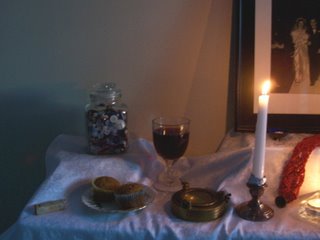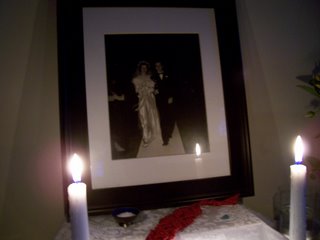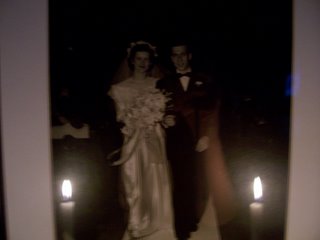



This "ofrenda" is offered for my parents. Mom passed away in December 1983 and Dad in July 2001. I can not separate myself from them. The reader would say "of course you can't separate yourself from your parents." My version is that I still think of them every day. And in some ways they live on in my house. I use Mom's pots & pans & big spoons and Dad's end table sits beside my living room sofa. Mom's grandfather's desk is my desk; Dad's storage chest is my storage chest. I understand myself to be part of their linear path.
The picture on the alter is of the two of them walking back down the aisle after their wedding. It is October 9, 1948. She is 22 and he is 25. He has returned from an Austrian POW camp at the end of WWII. She is an only child who loves to dance. They meet at Duke University and marry after she graduates. Their life is before them and they do not know what it will contain. They do not know how hard they will work for the next 30 years. They do not know of the 4 children they will have, or of the cancer that will start to consume her in 20 years. They don't know of the anger and hurt and frustration any more than they know of the joy and love and laughter. They do not know of the crazy pets, including a squirrel named Pepperoni that got equal billing at one of the daughter's wedding, or the houses with water pipes that freeze in the winter or cars that backfire and scare the neighbors. They do know, however, that they have joined hands and have chosen to set out together.
Under the picture in the middle is a small blue salt dish filled with salt. The salt dish was my grandmother's and then my mother's. There is also a red macrame strand attached to a bell--one of Mom's Christmas decorations, and a celadon green stone--the color of love. In front stand 6 candles: one grouped in a foursome--four cardinal directions/four children and a candle for each Mom & Dad, in silver candlesticks they received as a wedding gift.
To the right of the picture are flowers from my garden--yellow St. John's Wort and one magenta coneflower that bloomed this past week! There are also two dishes of candy. The dishes are from my grandmother's china that we used at Christmas. One dish contains butterscotch for Dad--a first generation American who parents came from Scotland. The other dish holds candy corn--Mom loved it! Behind the dishes is an old deck of cards. We were a family of card players--hearts, spades, double solitare. Also on the right are two glasses of water, should Mom and Dad get thirsty.
To the left of the picture is a glass of wine (cheers!), a big jar of buttons handed down from my mother's side. In it are buttons from her mother, herself, and me. I will pass it on to my daughter. For sweet bread, I offer them applesauce muffins. These are a family favorite--Mom made them at least once a month and they never lasted long... I've also added a small brass dish shaped like a porthole. This was Dad's. I gave it to him one Christmas and asked for it back when he died. He always had boats--big boats, little boats, boats that worked and boats that gave out. "Running aground" was a common term in our family... And finally, a quirky little set of carved dice from Mexico that I found in his desk while cleaning out his house--why he had it I have no idea, but knew it had to go on the altar!
I now live in the same neighborhood we lived in when we moved to town in 1965. I'm the only one who has stayed in Greensboro. Everyday I live in my memories--driving past Friendly Shopping Center, going to the Farmer's Market in the dark morning, Mom teaching us to drive on these streets--I think of these things as I move through my days, now in October 2006 and everyday before today. There is no separation between then and now--it's a continuation. I miss my parents. I feel them around me, although I couldn't say why or how. I wonder how they are doing, if they see each other, if they see us 4 kids and our kids and our crazy pets. I would love to hug them once more...
